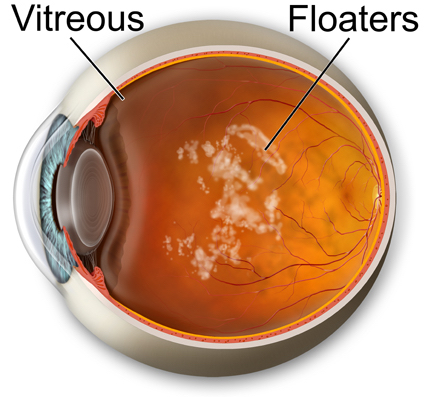
What is an eye floater?
Eye floaters appear as shapes in our vision, such as an odd squiggle or cobweb form, that follow our line of sight. Floaters are actually small parts of leftover blood vessels, retinal fibers, "clumped" vitreous humour (the clear, jelly-like substance that fills the eyeball) or other materials within the eye itself. These floaters are cast off into the middle of the eye where they typically remain unnoticed - that is, until they float across your line of vision.

What causes eye floaters?
Age is the most common cause of eye floaters. Often around the age of 50-60, the jelly-like vitreous humour can start to shrink and become more watery. Floaters can then form into clumps and strands and drift more easily, migrating into the visual field.
Retinal detachment can also cause eye floaters. If an overwhelming number of floaters suddenly appears in your vision, and those floaters are accompanied by peripheral vision problems or "flashes," immediately seek medical attention. These are symptoms of retinal detachment, which is a medical emergency!
Eye floaters seem to be associated with diabetes, nearsightedness, traumatic eye injury, cataract surgery and infection as well.
What are the consequences of eye floaters?
Floaters can become bothersome. While they are usually harmless, floaters' impact on visual health can diminish quality of life. In one recent study, many eye floater sufferers rated their quality of life to actually be lower than those with glaucoma, and similar to those with Age Related Macular Degeneration (AMD). Innocuous as they may seem, this research suggests we should not take eye floaters lightly.
What can you do about eye floaters?
Nutritional supplements for eye floater symptoms are appealing to many because they are affordable, non-invasive and safe. Many eye floater sufferers refuse to passively wait for the condition to subside; they wish to actively do something to help themselves. By addressing eye health measures such as tear production and tear film surface tension, supplements may help to ease many of the symptoms of eye floaters.
What to look for in eye supplements for Dry Eye
When shopping for eye floater supplements, keep in mind that chronic inflammation has been implicated with tear gland problems that exacerbate dry eye symptoms. Look for eye floater supplements that include turmeric (contains curcumin), a powerful natural inflammation modulator. Essential fatty acids such as the Omega-3s found in borage, flaxseed, and fish oil are also highly effective at easing inflammation and supporting tear production. Vitamins B6 and C are involved in essential fatty acid metabolism, and may help optimize Omega-3s in the body. Phospholipids such as phosphatidylcholine and phosphatidylserine further assist in stabilizing the eye's tear film layers.
In theory, all of these nutrients combine to support a healthy, comfortable and clear tear film layer that helps to optimize vision and reduce the symptoms of floaters.
Unfortunately, there is no cure for eye floaters. The good news is, eye floaters are usually a benign condition, which can only be confirmed by seeking the care of an ophthalmologist or optometrist. They may be annoying and distracting, but often pose no real threat. Better news still: The advent of nutritional supplements for symptoms of eye floaters might help to naturally ease the issue while supporting other aspects of peak eye health.
Related Links:
Medhelp - Floater Quality of Life Study
National Eye Institute - Facts About Floaters
PubMed - Study on Omega-3 Fatty Acids and Dry Eye
American Academy of Ophthalmology - What are Floaters?